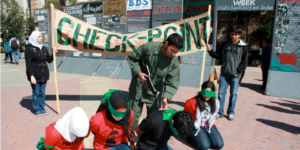
Tensions have been rising across college campuses nationwide as Students for Justice in Palestine (SJP) groups have erected “Gaza Solidarity Encampments” in response to Israel’s conduct during the current Hamas-instigated war.
Hidden between demands for their universities to sever ties with Israel and all Israel-related products, these encampments have not stopped short of promoting violence and antisemitism. Unsurprisingly, UCLA has become a breeding ground for this current wave of Jew-hatred.
Early on the morning of April 25, 2024, UCLA’s SJP chapter set up tents on the university’s main quad, demanding that the university cut ties with Israel and allow them unrestricted protest, regardless of legality.
For eight whole days, these protestors freely expressed their antisemitic and anti-US anarchical rhetoric. Law enforcement eventually intervened, removing the protestors and dismantling the encampment.
But why was such hostility allowed for eight whole days? Why wasn’t this unlawful, hateful demonstration disbanded from the outset?
It’s hard to imagine that administrators felt handcuffed to arguments of free speech. Any other members spewing hateful, violent rhetoric on campus would never be able to enjoy the same privileges that these encampment members did.
The anti-Israel protestors were allowed to spend their days shouting out antisemitic chants like “long live the intifada,” over a loudspeaker — all while representing their movement as a “student intifada” that needed to be “protected” by the administration.
The word “intifada” literally translates to “uprising” in Arabic, and represents two periods of mass violence and terrorism against innocent Israelis that included suicide bombings, public bus bombings, and the murder of infants.
Protestors also vandalized UCLA’s campus and held banners with antisemitic messages, such as writing in Arabic to ask Hamas’ military wing to “burn Tel Aviv to the ground,” and drawing a Star of David with directions to “step here.”
How can they honestly call for “justice” and “peace” while at the same time demanding the opposite? And yet, UCLA’s leaders felt no need to put an end to this malicious gathering.
If the barbaric rhetoric wasn’t enough, these protestors used their platform to repeatedly harass, and in some cases, even attack Jewish students suspected of being Zionist and peaceful pro-Israel activists.
During a pro-Israel counter-protest the following Sunday, April 28, when a student bent down to pick up a dropped Israeli flag, a pro-Palestinian mob surrounded her and kicked her in the head repeatedly.
In another shocking antisemitic incident that day, after an anti-Israel protester failed to destroy a pro-Israel protester’s sign, she violently tore his hat off and threatened to use her taser on him while brandishing the weapon in his face.
Again, the UCLA administration did nothing. This begs the question, are they afraid of being attacked themselves, or do they think any pro-Israel or Jewish students don’t deserve safety?
All of these instances clearly breach UCLA’s Student Group Conduct Code, which prohibits the “use or display of a weapon,” and “harassment in any form.” If administrators truly believe that assaulting and threatening to harm Jews does not violate the code, then it’s unclear what behavior would.
It took five entire days for the administration to simply recognize that Jewish UCLA students have undergone significant emotional distress, but then offering only a minimal gesture of care that amounted to little more than virtue signaling performative action.
We demand an explanation for why it took more than a week to remove these antisemites masquerading as peace activists from our campus.
We demand that such hateful protestors face adequate consequences for their actions, so that all students can once again feel safe.
UCLA administrators cannot continue to claim that they foster a safe and inclusive environment while barely lifting a finger to protect a vulnerable minority currently facing such unabashed hate.
It is time for the administration to prioritize the safety of Jewish students and take tangible steps to combat antisemitism on campus. The question is, will they?

